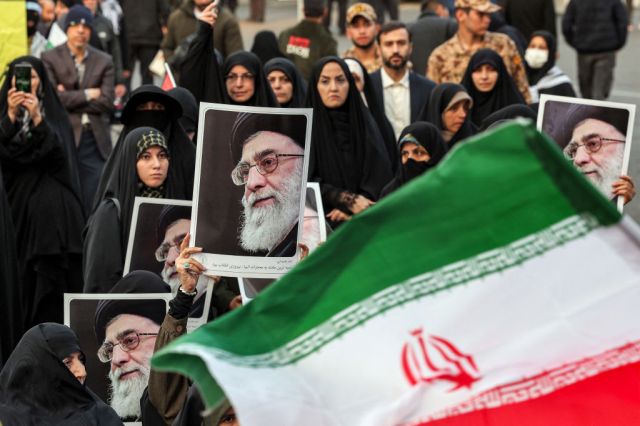The Supreme Leader is protected. Credit: AFP/Getty

Before Ayatollah Ali Hosseini Khamenei set out to conquer the Sunni Arab world in 1989, there were self-imposed rules that set real limits to Arab-Israeli warfare. In all the conflict between Israel and Arab states since May 1948, the world witnessed violence, saw civilians murdered, and heard countless expressions of hatred. But all that sound and fury obscured the rules that each side observed unilaterally.
At no point did Israel ever try to assassinate an Arab political leader, nor did any Arab state seek to kill an Israeli leader. Several Arab leaders were killed by fellow Arabs, and Israel lost one prime minister to a Jewish fanatic and a minister to a lone-wolf Palestinian assassin — but the prohibition of state assassinations was strictly observed.
Prisoners were also protected. In the 1948 war, both the Egyptian army and Jordan’s British-officered Arab Legion captured Jewish fighters of both sexes. These captives received Geneva convention treatment. They weren’t tortured, murdered, violated, or held as hostages to extract political concessions — as Hamas is currently doing and Hezbollah did in the past.
Similar restraint was practised by the Israeli army on a much larger scale in 1967 with its many thousands of Egyptian and Jordanian prisoners. Then, in 1973, when the Egyptian army captured Israeli prisoners along the Suez Canal, they were treated humanely. Afterwards, prisoners were swiftly exchanged with neither side seeking political concessions. The Syrian army, itself in perpetual and murderous internal strife, killed some of the few Israelis it captured in the 1973 war, abused more of them, and would not return them without extracting concessions. But this was very much the exception to Arab state norms.
All this changed when Iran’s Shia and Persian theocracy arrived on the scene in the early Eighties, very deliberately outdoing all Arab states in hostility to Israel — with total destruction its declared aim. Though refraining from directly targeting Israel, the regime funded and armed all its enemies from Lebanon to Yemen on an ever larger scale. Hezbollah received billions of dollars in armaments and salaries; as did Yemen’s Houthis, who have spent the past year attacking shipping in the Red Sea and launching ballistic missiles at Israel. In Iraq, the Shia Kataeb militia is also armed and directed by Iran.
The October 7 attacks changed the rules. And in April, Iran attacked Israel directly for the first time, by launching cruise missiles, armed drones and ballistic missiles, each the size of a tanker truck. With that first ever direct attack, Ayatollah Khamenei had crossed a major red line — but Israel’s unique ballistic missile defences intercepted almost all the ballistic missiles that might have caused any real damage. Israel’s retaliation was limited, sending a single attack drone that did destroy its target, an anti-aircraft missile launcher near a nuclear site. Was Israel’s restraint misunderstood as weakness? Iran doubled down on October 1 this year with a much larger missile barrage after the assassination of Hamas commander Ismaile Haniyeh in Tehran.
Israel waited before responding. Only an attack on Iran itself would be an adequate counter move. The aim would be to rattle an already insecure regime; the recent presidential elections having proved that over 70% of the Iranian population is squarely opposed to the regime. Runaway inflation (it now takes 63,550 rials to buy a dollar) means that those who live on salaries go hungry by the middle of the month. A classic pre-revolutionary mood prevails.
And so, Israel targeted military sites in Tehran, Khuzestan and Ilam provinces. With no long-range bombers, it could still attack Revolutionary Guard headquarters in important cities, the larger Mashad headquarters and of course the Thar Allah (“revenge of Allah”) general headquarters in Tehran. The aim was to humiliate the Guards, who exist to impose Ayatollah rule on an increasingly anti-clerical, even anti-religious population. It could even spark unrest in Tehran and those places where there are vast anti-regime majorities. But most targets were substantive and not just psychological, notably missile-production plants.
Biden’s officials vehemently opposed the most productive target, Iran’s oil export terminal on Khark island, a lucrative source of the funding for Shia militias. According to Benjamin Netanyahu’s office, however,these new targets were chosen in accordance with Israel’s “national interests, and not according to American dictates”. With red lines crossed, though, another target would be Ayatollah Ali Khamenei himself, the Supreme Leader of Iran. Various Israeli military officials have already pointed to him as a key objective.
Whatever precautions were taken to protect the Ayatollah before will have been redoubled after Mossad managed to kill the official leader of Hamas, Ismail Haniyeh, within the Revolutionary Guard’s VIP guest house in Tehran. Especially since that feat was followed by the Israel air force killing of Hezbollah’s founder, Hassan Nasrallah, hidden in a supposedly secret “bombproof ” command bunker, deep beneath a Beirut apartment house.
Khamenei, though, has a protection more secure than any deep bunker, because the White House officials who decide matters for Biden used both generous promises and harsh threats to dissuade any Israel attempt to eliminate the architect of this war. And so, as Iran’s humiliation is heightened, the world waits to see what the toxic regime’s next move will be. And the Middle East keeps on burning.









